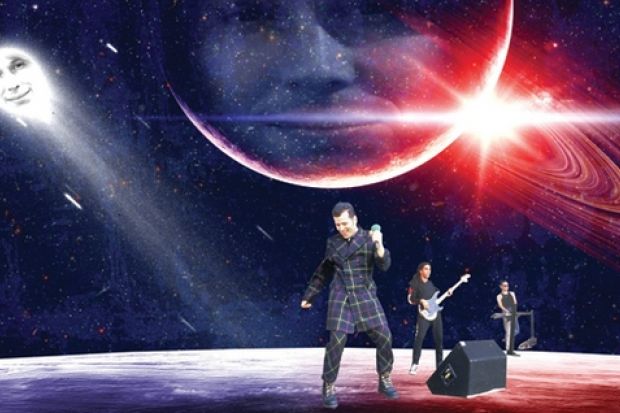With his regular appearances on our television screens, Brian Cox is the speeded-up version of Halley's comet. His head appears before his tail has quite vanished. I have a feeling that he may be in danger of violating a law of physics, but I haven't a clue which one. That it's impossible to catch up with yourself? I never can.
His new series, Wonders of the Universe (BBC Two, Sunday 13 March, 9pm), has burst upon us almost before his old one, Wonders of the Solar System, has faded away. Both confirm an old suspicion that the more science explains something, the more marvellous and awe-inspiring it becomes. With art, it's the opposite.
"Why are we here?" asks Brian. "Where do we come from?" These are "the most enduring questions and it's an essential part of human nature to want to find the answer". I've obviously been listening to the wrong people. I thought the most enduring question was how to reduce the budget deficit. On that point, a recent study by the University of Glasgow claimed that a one-off 20 per cent tax on the richest 10 per cent would clear the debt in one go, although the chances of that happening are even more unlikely than the chain of events that led to our being here.
This was Brian's subject. Last week, it was time. Apparently most of the cosmos' life is spent in dying slowly, a notion that would have brought a smile to the face of Samuel Beckett. Well, a grimace of satisfaction anyway. Brian smiles constantly, his boyish good looks seducing the Universe into giving up its secrets. Every atom in my body, he tells us, was once part of a cloud, a tree, a dinosaur. Pity those poor celebrities on Who Do You Think You Are? They can trace their ancestry back only a few generations.
My atoms, continued Brian proudly, were also part of a rock, "definitely a rock". Of course they were. A rock group. D:Ream, of which he was a member. You may remember their most famous hit: Things Can Only Get Better. At times, the photography in the programme was reminiscent of the lost art of the album cover. Brian in a dip between two hills, Brian materialising from a mist and, most iconic of all, Brian walking away from an exploding prison. But these images weren't just aesthetic, they illustrated difficult scientific concepts. Steam from the El Tatio geysers was the symmetry that appeared with the Big Bang, the surrounding ice-laced landscape the complex structures that emerged one-billionth of a second later.
Brian demonstrated what happened next by blowing bubbles. Two protons stick together and one becomes a neutron. Hey presto, you have hydrogen. I think. And if you keep adding protons you get all 92 naturally occurring elements. Between them they account for everything from a blade of grass to Saturn's rings. It's not how much you've got, it's what you do with it.
The heavier elements solidify in the heart of a dying supernova. One, affectionately called Betelgeuse, is about to blow any minute. It should be quite a show. The energy released is more than our Sun will generate in its entire existence. Don't worry. It's 600 light years away. Earth should be safe. But then, you never know, do you?
It's stunning to think that a star's waste matter is the substance of a wedding ring. Gold is not a very useful metal, but it's our most valuable. I'm sure there's a lesson here for those about to dismantle our education system, but I can't think what it is.
The heavenly mood was shattered at the end by what sounded like a sink waste disposal unit trying to sing The Beatles' Across The Universe. It was back to Earth with a screech. One of the downsides of the Universe having assembled itself is Social Services. At the age of 10, Neil Morrissey and his brother Steve found themselves in court for petty theft. "It was a bit like being in the headmaster's study. We thought we'd have to say sorry and then we'd be back in the park on the swings" (Care Home Kid, BBC Two, Thursday 7 April, 9pm)
But they were taken out through separate doors to different children's homes without even being allowed to say goodbye to their parents. Neil caught up with some of those he had known in care, a term that seems to mean instilling guilt, self-loathing and worthlessness in those too vulnerable to resist. Geraldine self-harms to this day. And she was one of the lucky ones. Others were beaten, forced to sit in a cold bath, or raped. There are some things that even Brian can't comprehend. Not yet, anyway. Let's hear what he has to say next time round.
Register to continue
Why register?
- Registration is free and only takes a moment
- Once registered, you can read 3 articles a month
- Sign up for our newsletter
Subscribe
Or subscribe for unlimited access to:
- Unlimited access to news, views, insights & reviews
- Digital editions
- Digital access to THE’s university and college rankings analysis
Already registered or a current subscriber? Login
